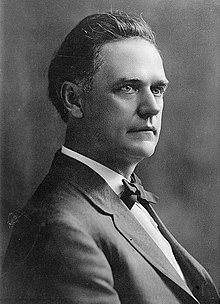Tom C. Rye
Thomas Clarke Rye (born June 2, 1863 in Camden , Tennessee , † September 12, 1953 ) was an American politician and the 36th governor of Tennessee.
Early years and political advancement
Young Thomas Rye grew up on his father's farm in Benton County and attended public schools in that district. He then studied law in Charlotte North Carolina . After his successful graduation, he returned to Camden in 1884, where he worked as a lawyer. In Camden, he served in the law firm's court for three years before becoming the director of the pension administration in Washington, DC for the next four years . In 1897 he moved to Paris, Tennessee, where he practiced as a lawyer again. In 1908 he became a district attorney for the 13th judicial district in the country. He held this position until 1914.
Governor of Tennessee
In 1914, Rye was nominated for governor by the Democratic Party. Since he had stayed out of the internal party dispute over prohibition and the policies of ex-governor Malcolm R. Patterson in recent years , he was a sustainable candidate for all Democrats. Many Democratic voters who had elected Republicans in the previous two elections out of anger over the party's dispute have now returned to Democrats and elected Rye governor by over 20,000 votes. This prevented a third election of his predecessor Ben W. Hooper . Rye stood up for Prohibition and was supported in it by Patterson, who had changed from a staunch opponent of Prohibition to a proponent of it. As governor, Rye campaigned for more consistent enforcement of the law. He gave the courts greater powers by law, including a passage that made it easier to dismiss corrupt officials. He made the city administrations responsible for the implementation of the existing laws. The Ouster-Law Act, passed in 1915, allowed the suspension of officials who refused to carry out the country's laws. This law was primarily directed against the powerful and influential Mayor of Memphis Edward Crump (1874-1954), who refused to enforce the Prohibition Act in Memphis. Rye succeeded in ousting the mayor from office, but behind the scenes Crump remained an influential politician who, with his political machinery, had great influence not only in Tennessee but also throughout the United States in the decades that followed until the late 1940s should exercise. Governor Rye also established a State Highway Department. In this context, the registration of cars and trucks, as well as a road tax, was introduced in Tennessee. Financial management and education were also reformed. During his second term in office, the United States entered the First World War. About 80,000 Tennessee men were called to arms. For Tennessee, the war had a good side too. Due to the military requirements for armaments, thousands of workers found new jobs in partly newly built armaments factories. As a result, Tennessee experienced a significant economic boom. At the end of his second and final term in office, the United States passed the 18th Amendment to the Constitution, which introduced prohibition at the federal level. This confirmed Rye's policy in this regard. However, the law has not proven itself in practice. Organized crime experienced an enormous boom in the 1920s with alcohol smuggling. As a result, the 18th Amendment to the Constitution was repealed in 1933.
Old age and death
After leaving the office of governor, Rye resumed his legal practice in Paris. He later became Chancellor of the 8th Chancery Court of Tennessee. Rey died in 1953 at the age of 90.
He was married to Bettie Arnold with whom he had two children.
literature
- Robert Sobel and John Raimo (Eds.): Biographical Directory of the Governors of the United States, 1789–1978. Volume 4, Meckler Books, Westport 1978. 4 volumes
Web links
- Tom Rye in the National Governor Association (English)
- The governors of Tennessee (English)
| personal data | |
|---|---|
| SURNAME | Rye, Tom C. |
| ALTERNATIVE NAMES | Rye, Thomas Clarke |
| BRIEF DESCRIPTION | Governor of Tennessee |
| DATE OF BIRTH | June 2, 1863 |
| PLACE OF BIRTH | Camden , Tennessee |
| DATE OF DEATH | September 12, 1953 |


